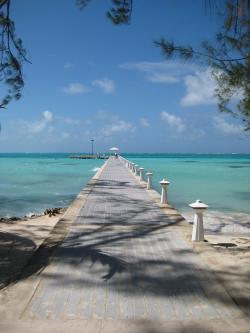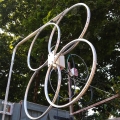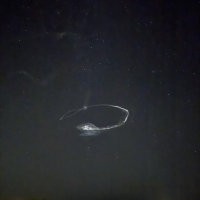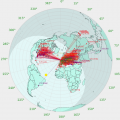jks
About
- Username
- jks
- Joined
- Visits
- 36,750
- Last Active
- Roles
- Member, Administrator, Moderator
- Points
- 670
Reactions
-
v1.391,392,393,394: New noise blanker and filters
From the CHANGE_LOG file:v1.391 May 23, 2020 User interface changes: SAL, SAU mode passband image will only show single sideband (just like LSB, USB). Ctrl/alt-click on mode button toggles modes backwards (most useful with SAM modes). Same works with keyboard shortcuts, e.g. ctrl/alt-A toggles SAM modes backwards. Noise blankers and filters: Reworked the audio tab user interface to support multiple blanker/filter algorithms. New algorithms planned but not yet available are greyed-out in the menus. From Warren Pratt's wdsp package added the variable-leak LMS algorithm. Merged Howard Su's RPi changes. Note: RPi is not officially supported by KiwiSDR. Ask for help on the KiwiSDR forum: http://forum.kiwisdr.com/discussion/1986/port-kiwisdr-to-raspberrypi-3b Bug fixes: Audio recordings made in SAS (synchronous AM stereo) mode now work. Fixed problem with ITU region 2 Kiwis and shift-clicking waterfall in 75/80m band segment. from lazywalker: fixed problems with frequency memory and reload value when transverter offset used. -
v1.391,392,393,394: New noise blanker and filters
From the CHANGE_LOG file:v1.391 May 23, 2020 User interface changes: SAL, SAU mode passband image will only show single sideband (just like LSB, USB). Ctrl/alt-click on mode button toggles modes backwards (most useful with SAM modes). Same works with keyboard shortcuts, e.g. ctrl/alt-A toggles SAM modes backwards. Noise blankers and filters: Reworked the audio tab user interface to support multiple blanker/filter algorithms. New algorithms planned but not yet available are greyed-out in the menus. From Warren Pratt's wdsp package added the variable-leak LMS algorithm. Merged Howard Su's RPi changes. Note: RPi is not officially supported by KiwiSDR. Ask for help on the KiwiSDR forum: http://forum.kiwisdr.com/discussion/1986/port-kiwisdr-to-raspberrypi-3b Bug fixes: Audio recordings made in SAS (synchronous AM stereo) mode now work. Fixed problem with ITU region 2 Kiwis and shift-clicking waterfall in 75/80m band segment. from lazywalker: fixed problems with frequency memory and reload value when transverter offset used. -
KiwiSDR production status and availability
-
BeagleBone AI
Below shows progress with an experiment to get a 14-channel configuration working using a BeagleBone AI. The challenge is to move as much processing to the second cpu core of the AI as possible so as not to impact the realtime requirements of serving the 14 audio channels (plus the usual 12-channel GPS etc.) It seems to work. A 14 audio DDC + 1 waterfall DDC configuration (rx14_wf1) was made to fit in the FPGA (LUTs now 97% full) by reducing the amount of CIC filtering logic slightly.
Note below that the processor temperature and clock speed are displayed. The cores are currently running at rate automatically adjusted based on temperature between 1.0 - 1.5 GHz due to the reduced cooling configuration I'm testing.
The Kiwi's internal WSPR extension is running on all 14 channels as a worst-case test since WSPR decoding is so cpu intensive. The fact that this works does not change the fact that Rob's wsprdaemon is the superior solution for anything but casual WSPR monitoring. In fact 14 channels was chosen in support of getting a single Kiwi to work in an all-band wsprdaemon setup.
Below is output from the Linux "ht" command. It shows how certain components of the software have been moved to new Linux processes separate from the main Kiwi process and "locked" to the second core of the processor. "kiwid" is the main process and is locked to cpu0 as seen in the "cpu" column. The other "kiwi.xxx" processes are locked to cpu1. Of interest here is the "kiwi.wsp" process which runs the collective WSPR decoding of all 14 channels.
This is just a progress report. There is a long list of work to do. -
v1.391,392,393,394: New noise blanker and filters
From the CHANGE_LOG file:
This filter is on the main control panel, audio tab, "noise > filter" menu. Click the "more" button to the right of the menu to adjust the filter parameters, although the filter works well with the defaults. In some cases you might have to increase the filter gain to match the filter-off level, especially during A/B comparisons. Try it with a weak station on the AM broadcast band or ham band SSB signal.v1.394 May 31, 2020 Noise blankers and filters: Added the spectral noise reduction filter by Frank, DD4WH and Michael, DL2FW, via the Teensy-ConvolutionSDR and UHSDR projects. See: github.com/df8oe/UHSDR/wiki/Noise-reduction This noise filter works really, really well. Especially for voice signals. A good alternative to the LMS filters. Note that the Wild blanker and all the noise filters (wdsp, LMS, spectral) don't currently work with the modes: IQ, SAS and DRM (i.e. the 2-channel IQ modes). This will be fixed at some point.
Note that some noise filters always require their sections be enabled via the "more" panel. Otherwise simply selecting their menu entry does nothing. In particular the wdsp and LMS filters since they have independent denoiser and autonotch sections that are enabled separately (or both simultaneously).












